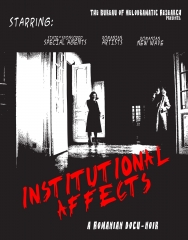The Bureau of Melodramatic Research
Institutional Affects in a Romanian Docu-Noir
Local experts act de facto as state sponsored special agents of the Institute for the Investigation of Communist Crimes. They examine archives, collect proofs, cut&paste biographies, issue reports in order to single out the original perpetrators and their crimes. The emotional surplus value of archives plays a key role in this process. However, the very existence of these archives was made possible by the bureaucratic ambition of the former Securitate which basically commissioned this huge (auto)biographical “literature” of mutual surveillance. Hard facts are impossible to detach from nightmarish fiction.
The casting session is open for artists, designers, sound engineers, filmmakers and writers dealing with recent history. They are invited to play a part in this film, convinced it will be a national blockbuster.
Book covers, posters, sound installations, exhibition displays, monuments are all props for this multimedia fiction. The Romanian New Wave is influenced by the same cinematic rules of docu-fiction. The depictions of the communist experience rely on powerful negative affects: drama, trauma, self-victimization, under the pretense of objectivity and realism.
The Bureau of Melodramatic Research is a dependent institution without permanent premises engaged in analyzing different elements of the melodrama genre and their influence on political, social and cultural spheres. It relies on strategic cooperation with fellow institutions, whose reserves of emotional capital it tracks and investigates. The first BMR temporary premises were opened in 2009 in Bucharest with the support of several Romanian public institutions, who agreed to lend the necessary pieces of furniture and in this way contribute to an analysis of bureaucratic sentimentality.
::lecture::
Friday, 4 November at 7 pm
DAZ, Trg bana J.Jelačića 1/3
Sustiva
